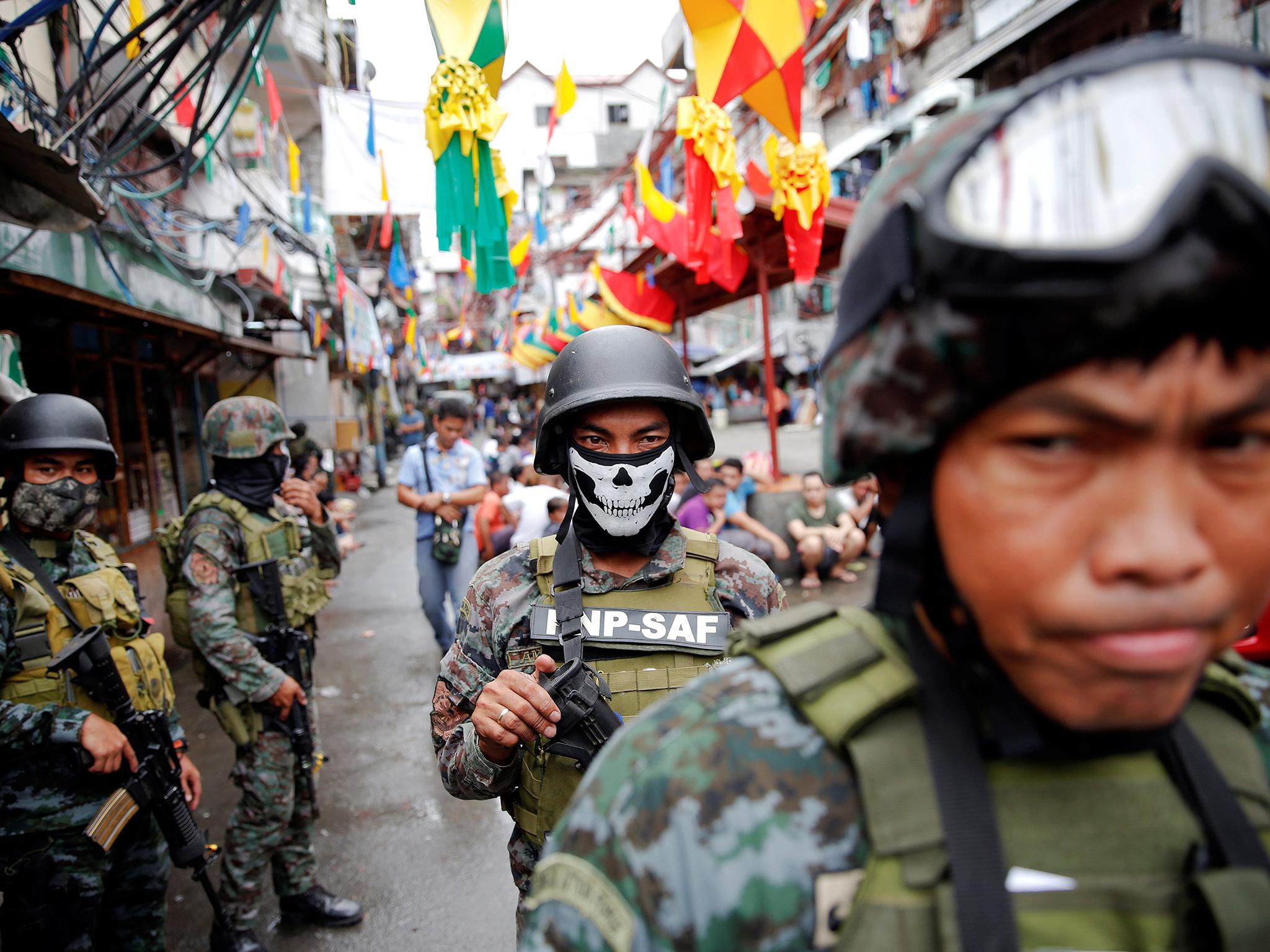Philippines President Rodrigo Duterte says he 'doesn't give a s*** about human rights' as 3,500 killed in war on drugs
Controversial leader dismisses deaths of innocent people and children as 'collateral damage'
Your support helps us to tell the story
From reproductive rights to climate change to Big Tech, The Independent is on the ground when the story is developing. Whether it's investigating the financials of Elon Musk's pro-Trump PAC or producing our latest documentary, 'The A Word', which shines a light on the American women fighting for reproductive rights, we know how important it is to parse out the facts from the messaging.
At such a critical moment in US history, we need reporters on the ground. Your donation allows us to keep sending journalists to speak to both sides of the story.
The Independent is trusted by Americans across the entire political spectrum. And unlike many other quality news outlets, we choose not to lock Americans out of our reporting and analysis with paywalls. We believe quality journalism should be available to everyone, paid for by those who can afford it.
Your support makes all the difference.The President of the Philippines has said he does not “give a s***” about human rights while dismissing the deaths of innocent civilians and children in his brutal war on drugs.
More than 3,500 people have been killed in the first 100 days of Rodrigo Duterte’s presidency, including suspected drug users, addicts, dealers and smugglers shot by security forces and vigilante gangs.
But international observers have warned that many of the dead are innocent people caught in the crossfire or murdered over personal scores.
Mr Duterte has been unrepentant about his calls for supporters to kill criminals, sparking alarm from the United Nations and international community, as well as a cooling of relations with the US after the President hit back at criticism by calling Barack Obama a “son of a whore”.
In an interview with Al Jazeera, he claimed there was “no crime” in threatening to kill the three million drug addicts he believes live in the Philippines.
Mr Duterte said he had launched his bloody war on drugs “because of the sheer number of people contaminated will pull my country down – it will destroy the next generation of Filipinos.”
“You destroy my country, I'll kill you,” he added. “And it's a legitimate thing. If you destroy our young children, I will kill you.
“That is a very correct statement. There is nothing wrong in trying to preserve the interest of the next generation.”
Mr Duterte said the deaths of children and innocent people would be investigated but said there was “no criminal liability” for security forces who kill innocent bystanders in operations, comparing them to the US-led coalition’s bombing of Isis territory.
“The West say it’s collateral damage [for them] but for us it’s murder,” he added.

“I would rather intimidate and strike fear into the hearts of the criminals [than fund drugs rehabilitation centres].
“If it involves human rights, I don’t give a s***. I have to strike fear because the enemies of the state are out there to destroy children.”
The President added that he did not regret his remarks about Mr Obama and threatened to withdraw from defence treaties with the US, as well as ending joint military exercises.
Mr Duterte was nicknamed “The Punisher” in his former post as mayor of Davao because of his violent rhetoric and alleged links to vigilante gangs but has denied any direct role in extrajudicial killings.
“We’re the ninth safest city - how do you think I did it?” Mr Duterte said in May 2015. “How did I reach that title among the world’s safest cities? Kill them all [criminals].”
The UN has repeatedly condemned his policies, as has the EU, human rights groups and the Roman Catholic Church, the dominant religion in the Philippines.
Earlier this year, the Office of the UN High Commissioner for Human Rights (OHCHR) called on Mr Duterte to end the “wave of extrajudicial executions and killings” and ensure legal process was upheld.
“Claims to fight illicit drug trade do not absolve the government from its international legal obligations and do not shield State actors or others from responsibility for illegal killings,” said Agnes Callamard, the new UN Special Rapporteur on summary executions.
She said Mr Duterte had given security forces and vigilantes “a licence to kill”, accusing him of “incitement to violence and killing, a crime under international law”.
Despite the warnings, the President's approval ratings in the Philippines remain high, standing at 86 per cent against just 3 per cent "disapproval" according to a survey released by Pulse Asia Research on Thursday
Mr Duterte is also currently embroiled in the territorial dispute over construction in the South China Sea, travelling to Beijing for talks with Xi Jinping and other Chinese leaders later this week.
In a speech before his departure, he said that while he will not bargain the Philippines' territorial claims, “there will be no hard impositions” as he tries to renew his nation's strained friendship with China and intensify two-way trade and investment.
Mr Duterte acknowledged that he could be impeached for conceding any sovereign rights in territorial waters, after The Hague ruled that China's claims to the sea on historical grounds were not valid under a 1982 UN treaty.

Join our commenting forum
Join thought-provoking conversations, follow other Independent readers and see their replies
Comments